CX551001 Commercial Law: Sales of Goods Act, CGA, FTA & Employment Law
VerifiedAdded on 2023/04/23
|13
|3270
|406
Report
AI Summary
This assignment provides solutions to problems related to Commercial Law, focusing on the Sale of Goods Act 1908, the Consumer Guarantees Act 1993, and the Fair Trading Act 1986. It analyzes scenarios involving the sale of goods, transfer of ownership, consumer rights, and misleading advertising. The solutions discuss the implications of these laws on various transactions, including contracts for sale, product descriptions, and remedies available to buyers and sellers. The assignment also touches upon employment law, examining liabilities for misrepresentations and breaches of contract. The document aims to provide a comprehensive understanding of the legal principles governing commercial activities and consumer protection.
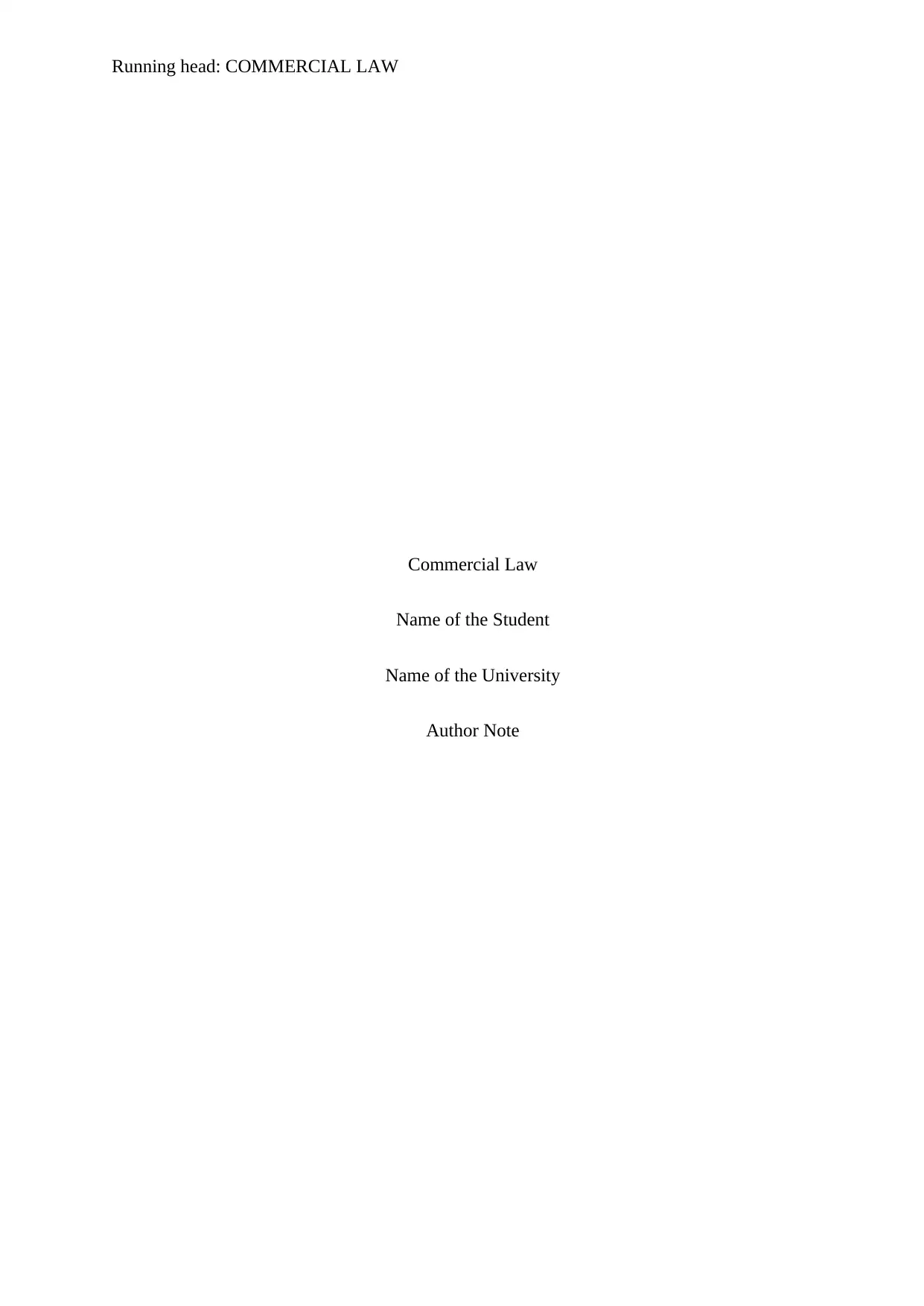
Running head: COMMERCIAL LAW
Commercial Law
Name of the Student
Name of the University
Author Note
Commercial Law
Name of the Student
Name of the University
Author Note
Paraphrase This Document
Need a fresh take? Get an instant paraphrase of this document with our AI Paraphraser
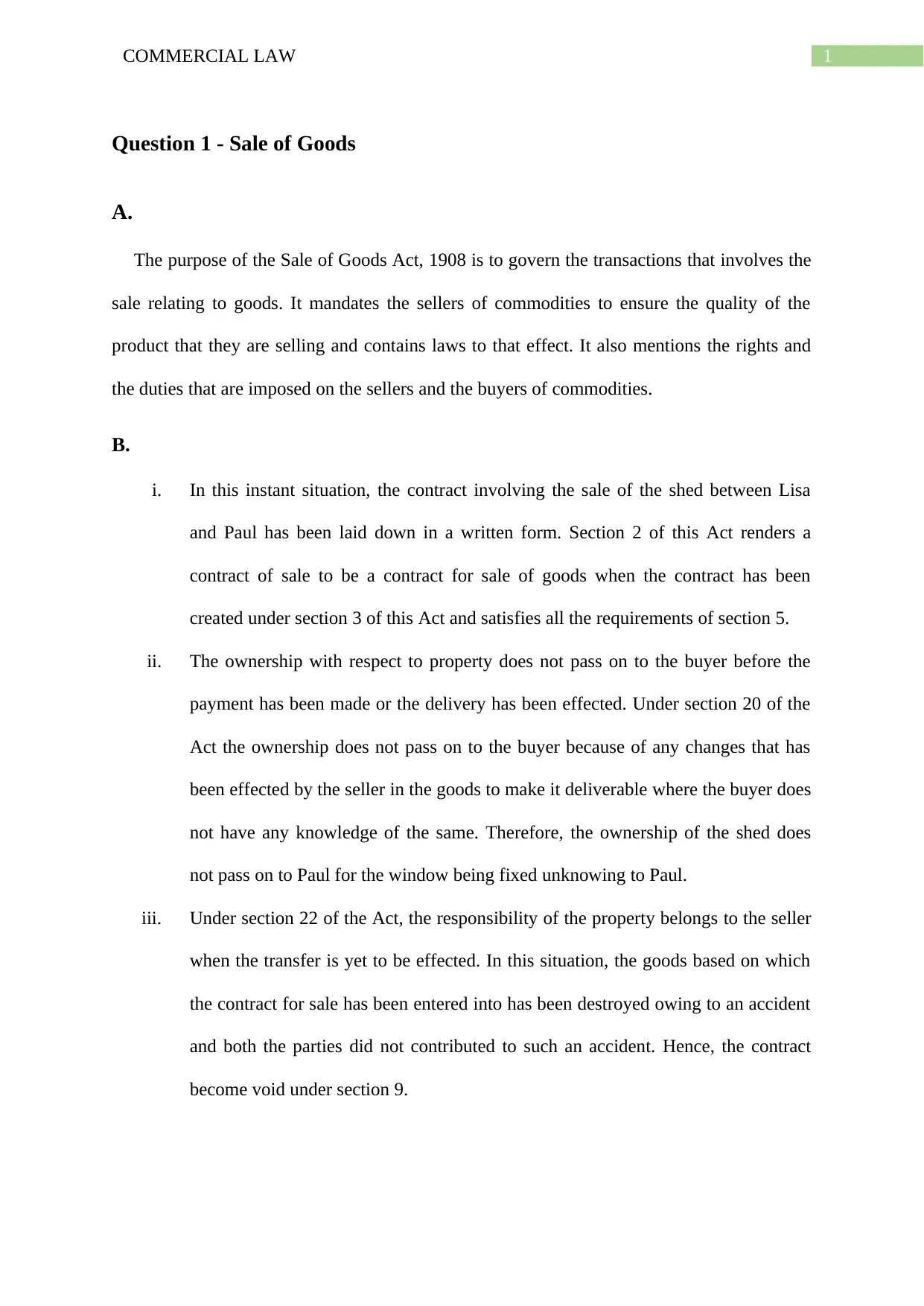
1COMMERCIAL LAW
Question 1 - Sale of Goods
A.
The purpose of the Sale of Goods Act, 1908 is to govern the transactions that involves the
sale relating to goods. It mandates the sellers of commodities to ensure the quality of the
product that they are selling and contains laws to that effect. It also mentions the rights and
the duties that are imposed on the sellers and the buyers of commodities.
B.
i. In this instant situation, the contract involving the sale of the shed between Lisa
and Paul has been laid down in a written form. Section 2 of this Act renders a
contract of sale to be a contract for sale of goods when the contract has been
created under section 3 of this Act and satisfies all the requirements of section 5.
ii. The ownership with respect to property does not pass on to the buyer before the
payment has been made or the delivery has been effected. Under section 20 of the
Act the ownership does not pass on to the buyer because of any changes that has
been effected by the seller in the goods to make it deliverable where the buyer does
not have any knowledge of the same. Therefore, the ownership of the shed does
not pass on to Paul for the window being fixed unknowing to Paul.
iii. Under section 22 of the Act, the responsibility of the property belongs to the seller
when the transfer is yet to be effected. In this situation, the goods based on which
the contract for sale has been entered into has been destroyed owing to an accident
and both the parties did not contributed to such an accident. Hence, the contract
become void under section 9.
Question 1 - Sale of Goods
A.
The purpose of the Sale of Goods Act, 1908 is to govern the transactions that involves the
sale relating to goods. It mandates the sellers of commodities to ensure the quality of the
product that they are selling and contains laws to that effect. It also mentions the rights and
the duties that are imposed on the sellers and the buyers of commodities.
B.
i. In this instant situation, the contract involving the sale of the shed between Lisa
and Paul has been laid down in a written form. Section 2 of this Act renders a
contract of sale to be a contract for sale of goods when the contract has been
created under section 3 of this Act and satisfies all the requirements of section 5.
ii. The ownership with respect to property does not pass on to the buyer before the
payment has been made or the delivery has been effected. Under section 20 of the
Act the ownership does not pass on to the buyer because of any changes that has
been effected by the seller in the goods to make it deliverable where the buyer does
not have any knowledge of the same. Therefore, the ownership of the shed does
not pass on to Paul for the window being fixed unknowing to Paul.
iii. Under section 22 of the Act, the responsibility of the property belongs to the seller
when the transfer is yet to be effected. In this situation, the goods based on which
the contract for sale has been entered into has been destroyed owing to an accident
and both the parties did not contributed to such an accident. Hence, the contract
become void under section 9.
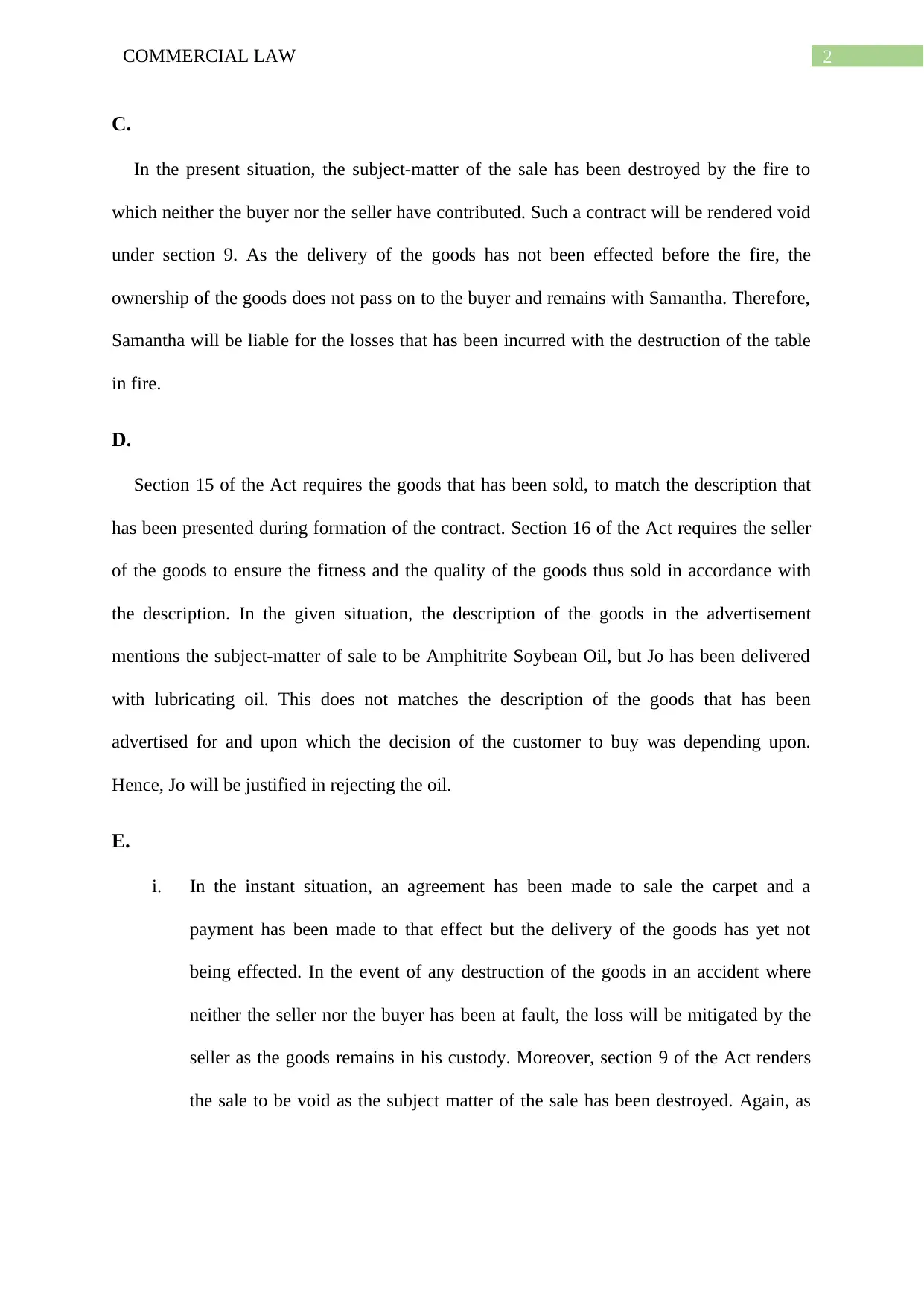
2COMMERCIAL LAW
C.
In the present situation, the subject-matter of the sale has been destroyed by the fire to
which neither the buyer nor the seller have contributed. Such a contract will be rendered void
under section 9. As the delivery of the goods has not been effected before the fire, the
ownership of the goods does not pass on to the buyer and remains with Samantha. Therefore,
Samantha will be liable for the losses that has been incurred with the destruction of the table
in fire.
D.
Section 15 of the Act requires the goods that has been sold, to match the description that
has been presented during formation of the contract. Section 16 of the Act requires the seller
of the goods to ensure the fitness and the quality of the goods thus sold in accordance with
the description. In the given situation, the description of the goods in the advertisement
mentions the subject-matter of sale to be Amphitrite Soybean Oil, but Jo has been delivered
with lubricating oil. This does not matches the description of the goods that has been
advertised for and upon which the decision of the customer to buy was depending upon.
Hence, Jo will be justified in rejecting the oil.
E.
i. In the instant situation, an agreement has been made to sale the carpet and a
payment has been made to that effect but the delivery of the goods has yet not
being effected. In the event of any destruction of the goods in an accident where
neither the seller nor the buyer has been at fault, the loss will be mitigated by the
seller as the goods remains in his custody. Moreover, section 9 of the Act renders
the sale to be void as the subject matter of the sale has been destroyed. Again, as
C.
In the present situation, the subject-matter of the sale has been destroyed by the fire to
which neither the buyer nor the seller have contributed. Such a contract will be rendered void
under section 9. As the delivery of the goods has not been effected before the fire, the
ownership of the goods does not pass on to the buyer and remains with Samantha. Therefore,
Samantha will be liable for the losses that has been incurred with the destruction of the table
in fire.
D.
Section 15 of the Act requires the goods that has been sold, to match the description that
has been presented during formation of the contract. Section 16 of the Act requires the seller
of the goods to ensure the fitness and the quality of the goods thus sold in accordance with
the description. In the given situation, the description of the goods in the advertisement
mentions the subject-matter of sale to be Amphitrite Soybean Oil, but Jo has been delivered
with lubricating oil. This does not matches the description of the goods that has been
advertised for and upon which the decision of the customer to buy was depending upon.
Hence, Jo will be justified in rejecting the oil.
E.
i. In the instant situation, an agreement has been made to sale the carpet and a
payment has been made to that effect but the delivery of the goods has yet not
being effected. In the event of any destruction of the goods in an accident where
neither the seller nor the buyer has been at fault, the loss will be mitigated by the
seller as the goods remains in his custody. Moreover, section 9 of the Act renders
the sale to be void as the subject matter of the sale has been destroyed. Again, as
⊘ This is a preview!⊘
Do you want full access?
Subscribe today to unlock all pages.

Trusted by 1+ million students worldwide
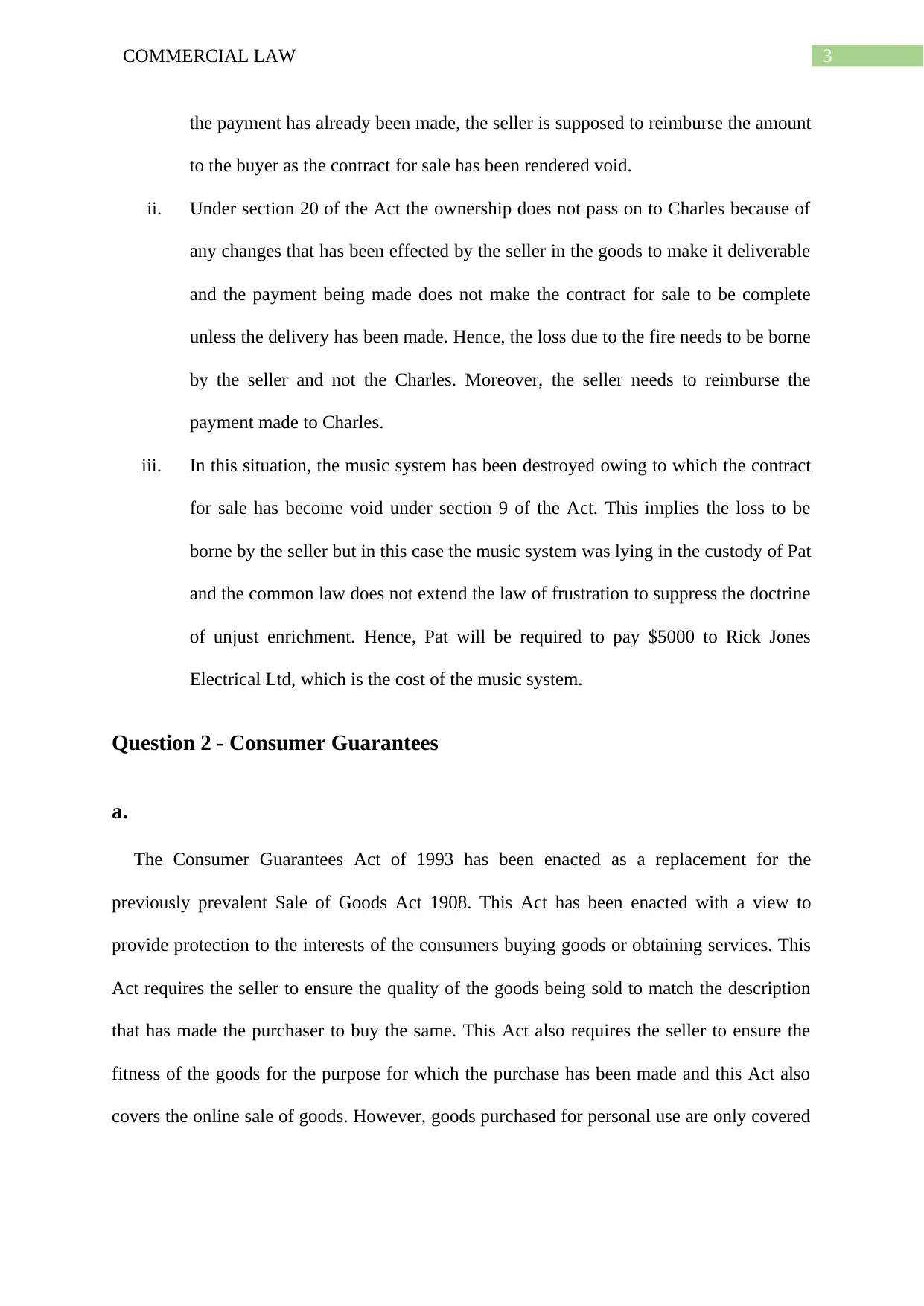
3COMMERCIAL LAW
the payment has already been made, the seller is supposed to reimburse the amount
to the buyer as the contract for sale has been rendered void.
ii. Under section 20 of the Act the ownership does not pass on to Charles because of
any changes that has been effected by the seller in the goods to make it deliverable
and the payment being made does not make the contract for sale to be complete
unless the delivery has been made. Hence, the loss due to the fire needs to be borne
by the seller and not the Charles. Moreover, the seller needs to reimburse the
payment made to Charles.
iii. In this situation, the music system has been destroyed owing to which the contract
for sale has become void under section 9 of the Act. This implies the loss to be
borne by the seller but in this case the music system was lying in the custody of Pat
and the common law does not extend the law of frustration to suppress the doctrine
of unjust enrichment. Hence, Pat will be required to pay $5000 to Rick Jones
Electrical Ltd, which is the cost of the music system.
Question 2 - Consumer Guarantees
a.
The Consumer Guarantees Act of 1993 has been enacted as a replacement for the
previously prevalent Sale of Goods Act 1908. This Act has been enacted with a view to
provide protection to the interests of the consumers buying goods or obtaining services. This
Act requires the seller to ensure the quality of the goods being sold to match the description
that has made the purchaser to buy the same. This Act also requires the seller to ensure the
fitness of the goods for the purpose for which the purchase has been made and this Act also
covers the online sale of goods. However, goods purchased for personal use are only covered
the payment has already been made, the seller is supposed to reimburse the amount
to the buyer as the contract for sale has been rendered void.
ii. Under section 20 of the Act the ownership does not pass on to Charles because of
any changes that has been effected by the seller in the goods to make it deliverable
and the payment being made does not make the contract for sale to be complete
unless the delivery has been made. Hence, the loss due to the fire needs to be borne
by the seller and not the Charles. Moreover, the seller needs to reimburse the
payment made to Charles.
iii. In this situation, the music system has been destroyed owing to which the contract
for sale has become void under section 9 of the Act. This implies the loss to be
borne by the seller but in this case the music system was lying in the custody of Pat
and the common law does not extend the law of frustration to suppress the doctrine
of unjust enrichment. Hence, Pat will be required to pay $5000 to Rick Jones
Electrical Ltd, which is the cost of the music system.
Question 2 - Consumer Guarantees
a.
The Consumer Guarantees Act of 1993 has been enacted as a replacement for the
previously prevalent Sale of Goods Act 1908. This Act has been enacted with a view to
provide protection to the interests of the consumers buying goods or obtaining services. This
Act requires the seller to ensure the quality of the goods being sold to match the description
that has made the purchaser to buy the same. This Act also requires the seller to ensure the
fitness of the goods for the purpose for which the purchase has been made and this Act also
covers the online sale of goods. However, goods purchased for personal use are only covered
Paraphrase This Document
Need a fresh take? Get an instant paraphrase of this document with our AI Paraphraser
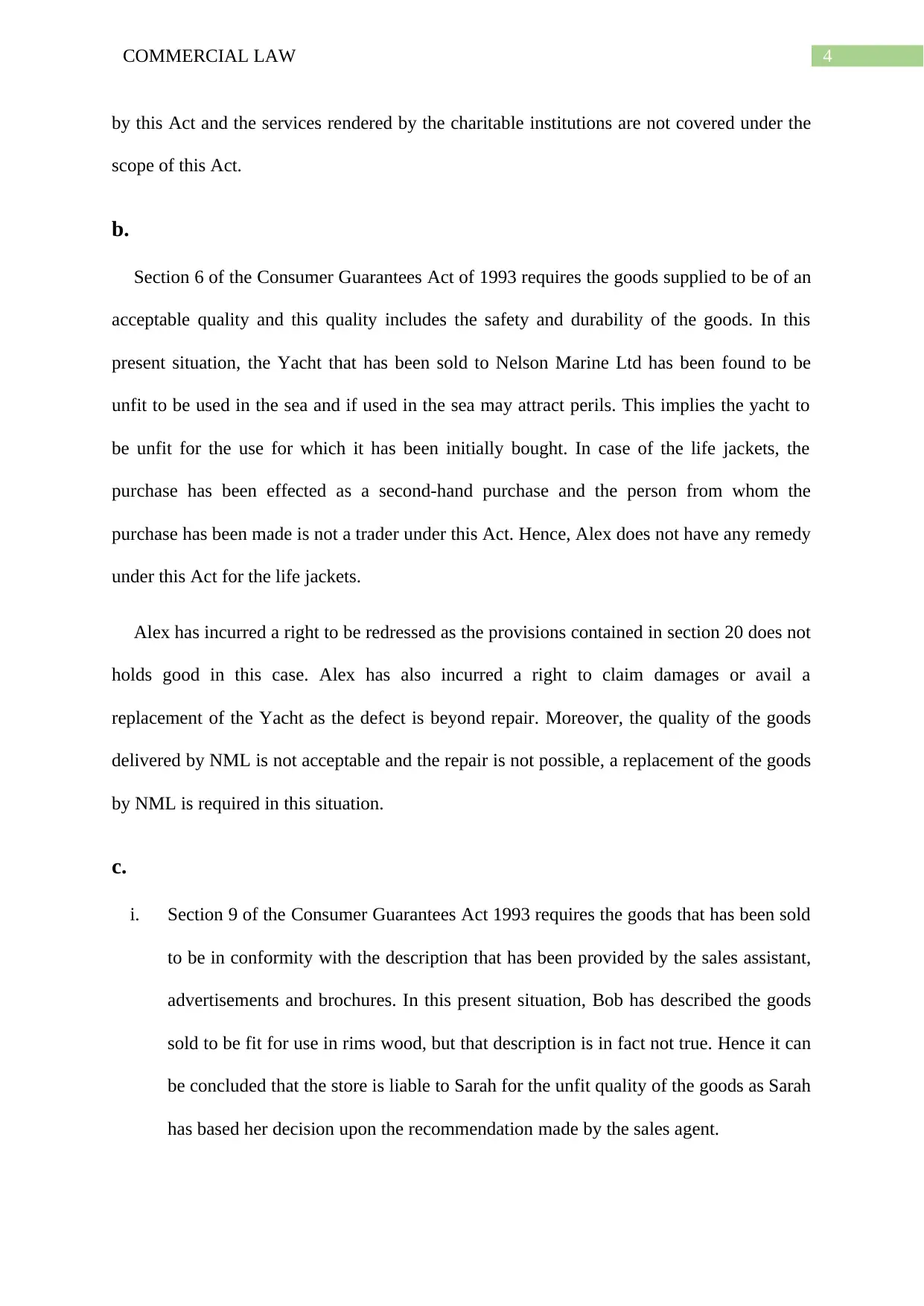
4COMMERCIAL LAW
by this Act and the services rendered by the charitable institutions are not covered under the
scope of this Act.
b.
Section 6 of the Consumer Guarantees Act of 1993 requires the goods supplied to be of an
acceptable quality and this quality includes the safety and durability of the goods. In this
present situation, the Yacht that has been sold to Nelson Marine Ltd has been found to be
unfit to be used in the sea and if used in the sea may attract perils. This implies the yacht to
be unfit for the use for which it has been initially bought. In case of the life jackets, the
purchase has been effected as a second-hand purchase and the person from whom the
purchase has been made is not a trader under this Act. Hence, Alex does not have any remedy
under this Act for the life jackets.
Alex has incurred a right to be redressed as the provisions contained in section 20 does not
holds good in this case. Alex has also incurred a right to claim damages or avail a
replacement of the Yacht as the defect is beyond repair. Moreover, the quality of the goods
delivered by NML is not acceptable and the repair is not possible, a replacement of the goods
by NML is required in this situation.
c.
i. Section 9 of the Consumer Guarantees Act 1993 requires the goods that has been sold
to be in conformity with the description that has been provided by the sales assistant,
advertisements and brochures. In this present situation, Bob has described the goods
sold to be fit for use in rims wood, but that description is in fact not true. Hence it can
be concluded that the store is liable to Sarah for the unfit quality of the goods as Sarah
has based her decision upon the recommendation made by the sales agent.
by this Act and the services rendered by the charitable institutions are not covered under the
scope of this Act.
b.
Section 6 of the Consumer Guarantees Act of 1993 requires the goods supplied to be of an
acceptable quality and this quality includes the safety and durability of the goods. In this
present situation, the Yacht that has been sold to Nelson Marine Ltd has been found to be
unfit to be used in the sea and if used in the sea may attract perils. This implies the yacht to
be unfit for the use for which it has been initially bought. In case of the life jackets, the
purchase has been effected as a second-hand purchase and the person from whom the
purchase has been made is not a trader under this Act. Hence, Alex does not have any remedy
under this Act for the life jackets.
Alex has incurred a right to be redressed as the provisions contained in section 20 does not
holds good in this case. Alex has also incurred a right to claim damages or avail a
replacement of the Yacht as the defect is beyond repair. Moreover, the quality of the goods
delivered by NML is not acceptable and the repair is not possible, a replacement of the goods
by NML is required in this situation.
c.
i. Section 9 of the Consumer Guarantees Act 1993 requires the goods that has been sold
to be in conformity with the description that has been provided by the sales assistant,
advertisements and brochures. In this present situation, Bob has described the goods
sold to be fit for use in rims wood, but that description is in fact not true. Hence it can
be concluded that the store is liable to Sarah for the unfit quality of the goods as Sarah
has based her decision upon the recommendation made by the sales agent.
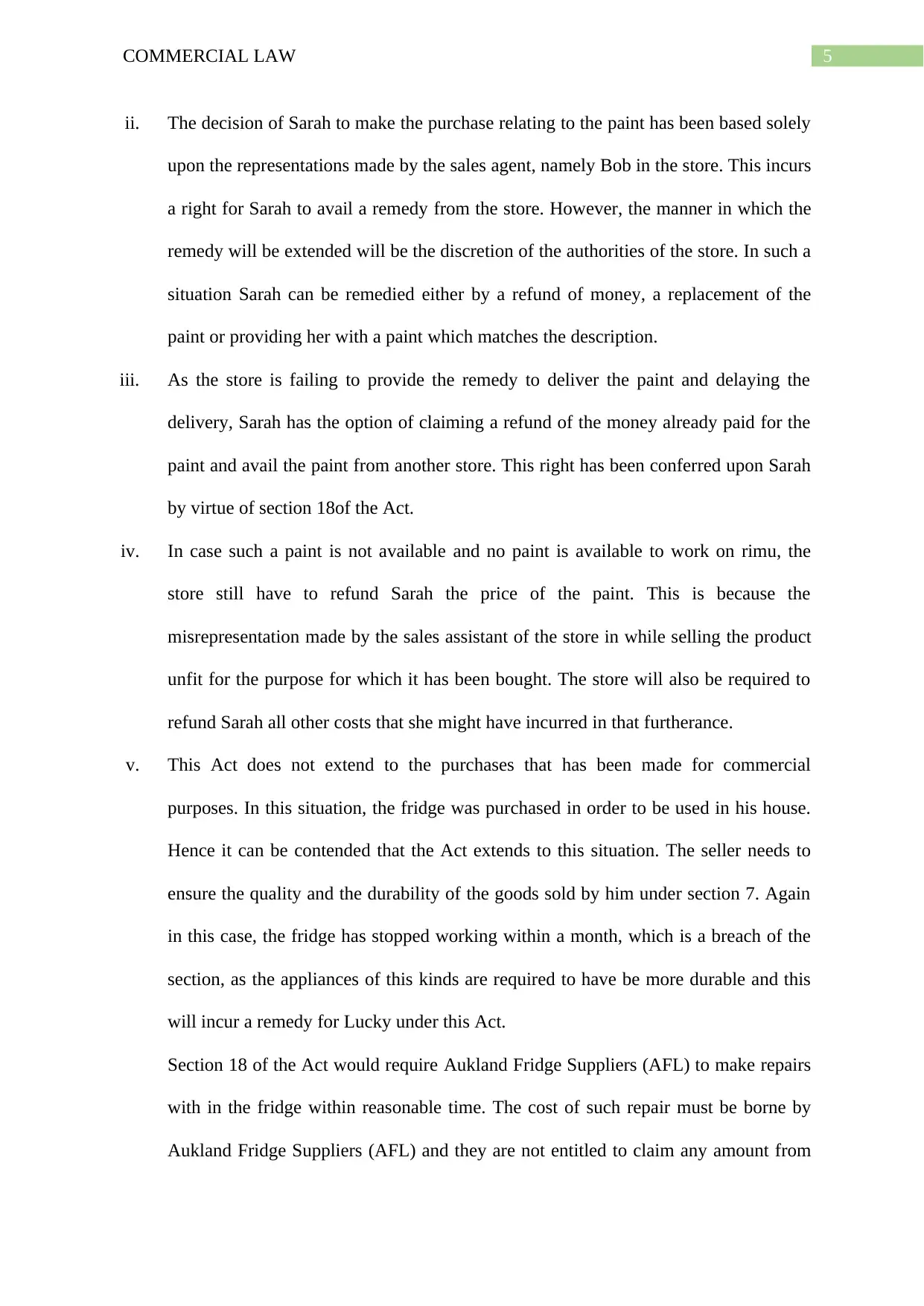
5COMMERCIAL LAW
ii. The decision of Sarah to make the purchase relating to the paint has been based solely
upon the representations made by the sales agent, namely Bob in the store. This incurs
a right for Sarah to avail a remedy from the store. However, the manner in which the
remedy will be extended will be the discretion of the authorities of the store. In such a
situation Sarah can be remedied either by a refund of money, a replacement of the
paint or providing her with a paint which matches the description.
iii. As the store is failing to provide the remedy to deliver the paint and delaying the
delivery, Sarah has the option of claiming a refund of the money already paid for the
paint and avail the paint from another store. This right has been conferred upon Sarah
by virtue of section 18of the Act.
iv. In case such a paint is not available and no paint is available to work on rimu, the
store still have to refund Sarah the price of the paint. This is because the
misrepresentation made by the sales assistant of the store in while selling the product
unfit for the purpose for which it has been bought. The store will also be required to
refund Sarah all other costs that she might have incurred in that furtherance.
v. This Act does not extend to the purchases that has been made for commercial
purposes. In this situation, the fridge was purchased in order to be used in his house.
Hence it can be contended that the Act extends to this situation. The seller needs to
ensure the quality and the durability of the goods sold by him under section 7. Again
in this case, the fridge has stopped working within a month, which is a breach of the
section, as the appliances of this kinds are required to have be more durable and this
will incur a remedy for Lucky under this Act.
Section 18 of the Act would require Aukland Fridge Suppliers (AFL) to make repairs
with in the fridge within reasonable time. The cost of such repair must be borne by
Aukland Fridge Suppliers (AFL) and they are not entitled to claim any amount from
ii. The decision of Sarah to make the purchase relating to the paint has been based solely
upon the representations made by the sales agent, namely Bob in the store. This incurs
a right for Sarah to avail a remedy from the store. However, the manner in which the
remedy will be extended will be the discretion of the authorities of the store. In such a
situation Sarah can be remedied either by a refund of money, a replacement of the
paint or providing her with a paint which matches the description.
iii. As the store is failing to provide the remedy to deliver the paint and delaying the
delivery, Sarah has the option of claiming a refund of the money already paid for the
paint and avail the paint from another store. This right has been conferred upon Sarah
by virtue of section 18of the Act.
iv. In case such a paint is not available and no paint is available to work on rimu, the
store still have to refund Sarah the price of the paint. This is because the
misrepresentation made by the sales assistant of the store in while selling the product
unfit for the purpose for which it has been bought. The store will also be required to
refund Sarah all other costs that she might have incurred in that furtherance.
v. This Act does not extend to the purchases that has been made for commercial
purposes. In this situation, the fridge was purchased in order to be used in his house.
Hence it can be contended that the Act extends to this situation. The seller needs to
ensure the quality and the durability of the goods sold by him under section 7. Again
in this case, the fridge has stopped working within a month, which is a breach of the
section, as the appliances of this kinds are required to have be more durable and this
will incur a remedy for Lucky under this Act.
Section 18 of the Act would require Aukland Fridge Suppliers (AFL) to make repairs
with in the fridge within reasonable time. The cost of such repair must be borne by
Aukland Fridge Suppliers (AFL) and they are not entitled to claim any amount from
⊘ This is a preview!⊘
Do you want full access?
Subscribe today to unlock all pages.

Trusted by 1+ million students worldwide
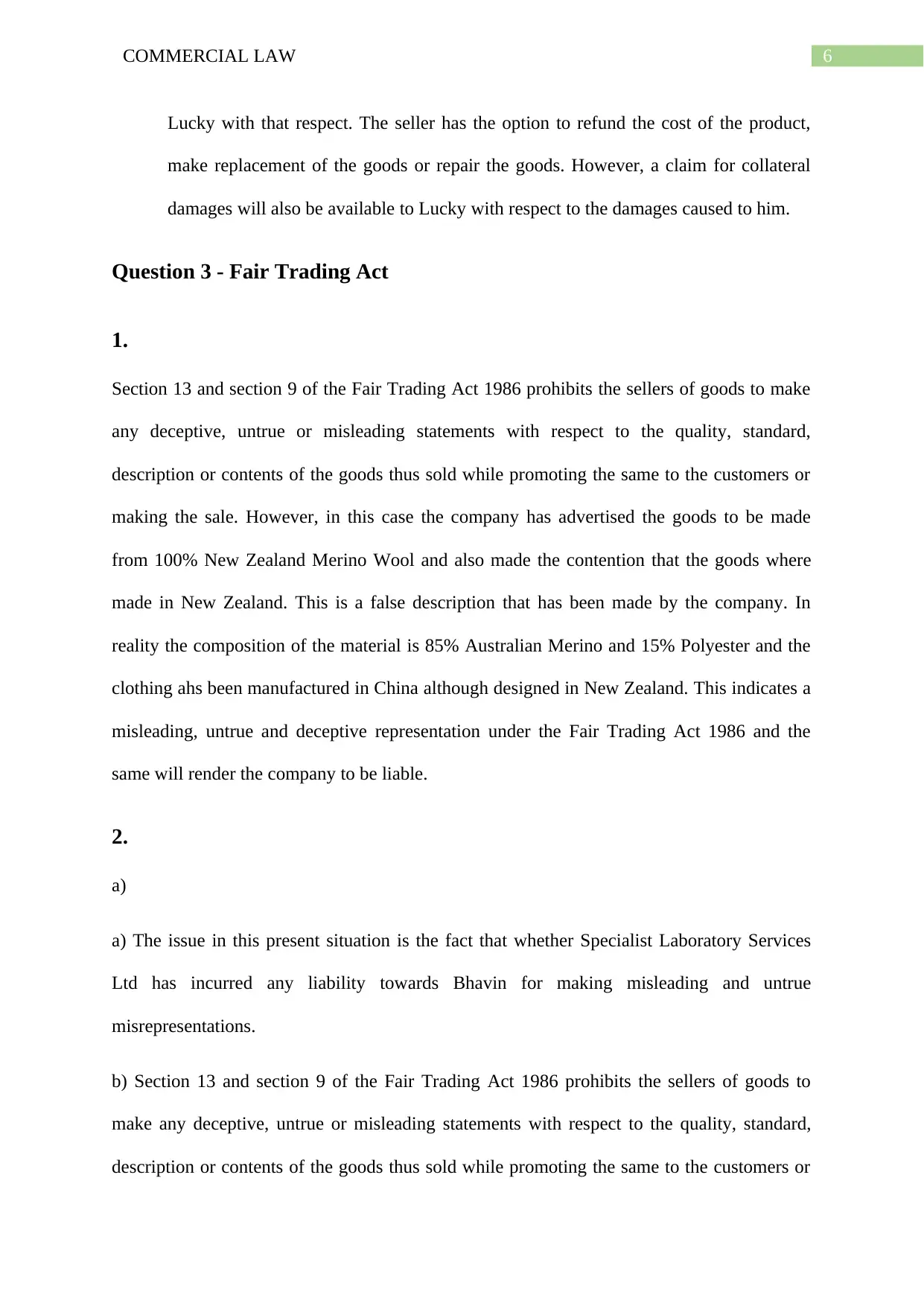
6COMMERCIAL LAW
Lucky with that respect. The seller has the option to refund the cost of the product,
make replacement of the goods or repair the goods. However, a claim for collateral
damages will also be available to Lucky with respect to the damages caused to him.
Question 3 - Fair Trading Act
1.
Section 13 and section 9 of the Fair Trading Act 1986 prohibits the sellers of goods to make
any deceptive, untrue or misleading statements with respect to the quality, standard,
description or contents of the goods thus sold while promoting the same to the customers or
making the sale. However, in this case the company has advertised the goods to be made
from 100% New Zealand Merino Wool and also made the contention that the goods where
made in New Zealand. This is a false description that has been made by the company. In
reality the composition of the material is 85% Australian Merino and 15% Polyester and the
clothing ahs been manufactured in China although designed in New Zealand. This indicates a
misleading, untrue and deceptive representation under the Fair Trading Act 1986 and the
same will render the company to be liable.
2.
a)
a) The issue in this present situation is the fact that whether Specialist Laboratory Services
Ltd has incurred any liability towards Bhavin for making misleading and untrue
misrepresentations.
b) Section 13 and section 9 of the Fair Trading Act 1986 prohibits the sellers of goods to
make any deceptive, untrue or misleading statements with respect to the quality, standard,
description or contents of the goods thus sold while promoting the same to the customers or
Lucky with that respect. The seller has the option to refund the cost of the product,
make replacement of the goods or repair the goods. However, a claim for collateral
damages will also be available to Lucky with respect to the damages caused to him.
Question 3 - Fair Trading Act
1.
Section 13 and section 9 of the Fair Trading Act 1986 prohibits the sellers of goods to make
any deceptive, untrue or misleading statements with respect to the quality, standard,
description or contents of the goods thus sold while promoting the same to the customers or
making the sale. However, in this case the company has advertised the goods to be made
from 100% New Zealand Merino Wool and also made the contention that the goods where
made in New Zealand. This is a false description that has been made by the company. In
reality the composition of the material is 85% Australian Merino and 15% Polyester and the
clothing ahs been manufactured in China although designed in New Zealand. This indicates a
misleading, untrue and deceptive representation under the Fair Trading Act 1986 and the
same will render the company to be liable.
2.
a)
a) The issue in this present situation is the fact that whether Specialist Laboratory Services
Ltd has incurred any liability towards Bhavin for making misleading and untrue
misrepresentations.
b) Section 13 and section 9 of the Fair Trading Act 1986 prohibits the sellers of goods to
make any deceptive, untrue or misleading statements with respect to the quality, standard,
description or contents of the goods thus sold while promoting the same to the customers or
Paraphrase This Document
Need a fresh take? Get an instant paraphrase of this document with our AI Paraphraser
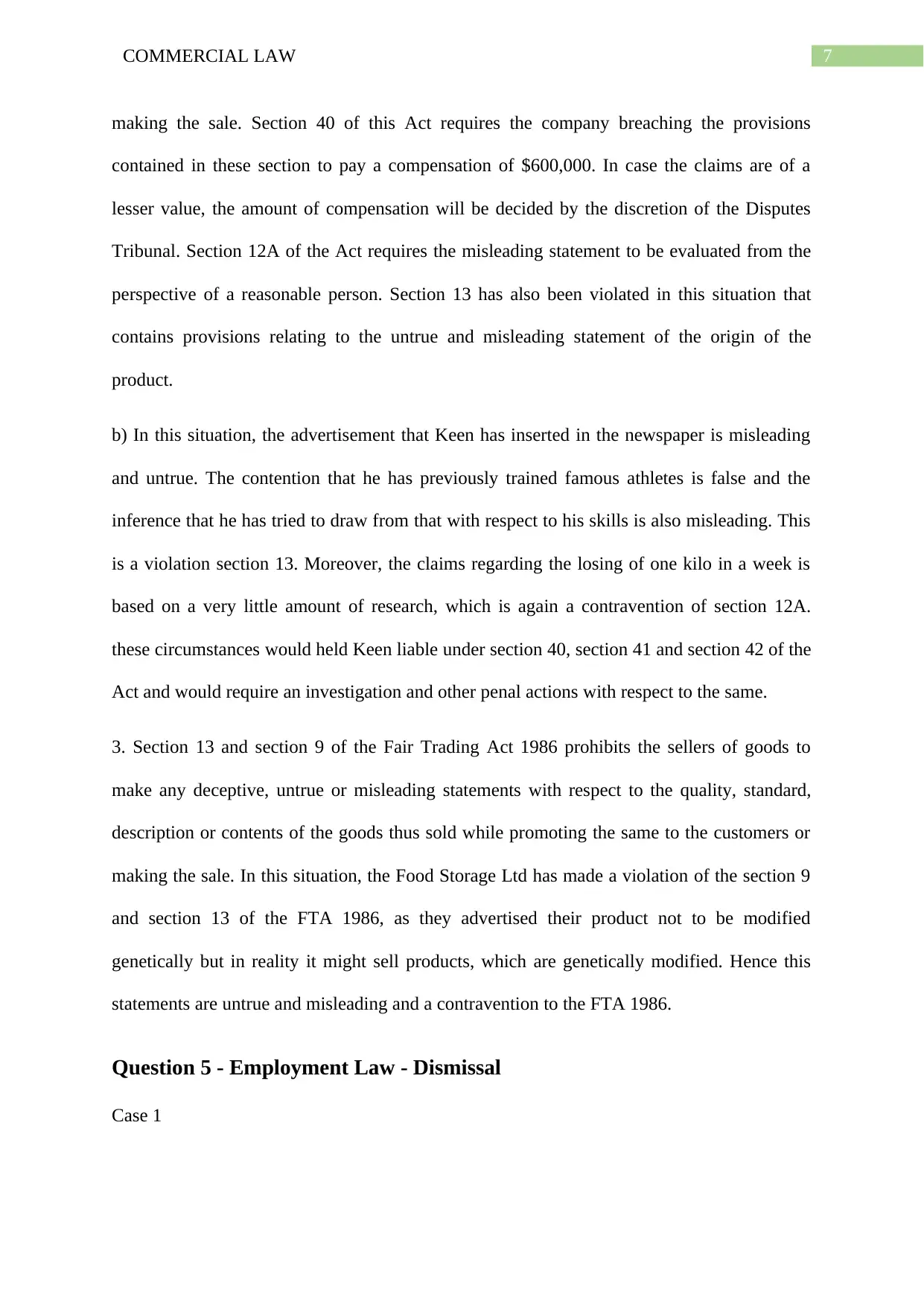
7COMMERCIAL LAW
making the sale. Section 40 of this Act requires the company breaching the provisions
contained in these section to pay a compensation of $600,000. In case the claims are of a
lesser value, the amount of compensation will be decided by the discretion of the Disputes
Tribunal. Section 12A of the Act requires the misleading statement to be evaluated from the
perspective of a reasonable person. Section 13 has also been violated in this situation that
contains provisions relating to the untrue and misleading statement of the origin of the
product.
b) In this situation, the advertisement that Keen has inserted in the newspaper is misleading
and untrue. The contention that he has previously trained famous athletes is false and the
inference that he has tried to draw from that with respect to his skills is also misleading. This
is a violation section 13. Moreover, the claims regarding the losing of one kilo in a week is
based on a very little amount of research, which is again a contravention of section 12A.
these circumstances would held Keen liable under section 40, section 41 and section 42 of the
Act and would require an investigation and other penal actions with respect to the same.
3. Section 13 and section 9 of the Fair Trading Act 1986 prohibits the sellers of goods to
make any deceptive, untrue or misleading statements with respect to the quality, standard,
description or contents of the goods thus sold while promoting the same to the customers or
making the sale. In this situation, the Food Storage Ltd has made a violation of the section 9
and section 13 of the FTA 1986, as they advertised their product not to be modified
genetically but in reality it might sell products, which are genetically modified. Hence this
statements are untrue and misleading and a contravention to the FTA 1986.
Question 5 - Employment Law - Dismissal
Case 1
making the sale. Section 40 of this Act requires the company breaching the provisions
contained in these section to pay a compensation of $600,000. In case the claims are of a
lesser value, the amount of compensation will be decided by the discretion of the Disputes
Tribunal. Section 12A of the Act requires the misleading statement to be evaluated from the
perspective of a reasonable person. Section 13 has also been violated in this situation that
contains provisions relating to the untrue and misleading statement of the origin of the
product.
b) In this situation, the advertisement that Keen has inserted in the newspaper is misleading
and untrue. The contention that he has previously trained famous athletes is false and the
inference that he has tried to draw from that with respect to his skills is also misleading. This
is a violation section 13. Moreover, the claims regarding the losing of one kilo in a week is
based on a very little amount of research, which is again a contravention of section 12A.
these circumstances would held Keen liable under section 40, section 41 and section 42 of the
Act and would require an investigation and other penal actions with respect to the same.
3. Section 13 and section 9 of the Fair Trading Act 1986 prohibits the sellers of goods to
make any deceptive, untrue or misleading statements with respect to the quality, standard,
description or contents of the goods thus sold while promoting the same to the customers or
making the sale. In this situation, the Food Storage Ltd has made a violation of the section 9
and section 13 of the FTA 1986, as they advertised their product not to be modified
genetically but in reality it might sell products, which are genetically modified. Hence this
statements are untrue and misleading and a contravention to the FTA 1986.
Question 5 - Employment Law - Dismissal
Case 1
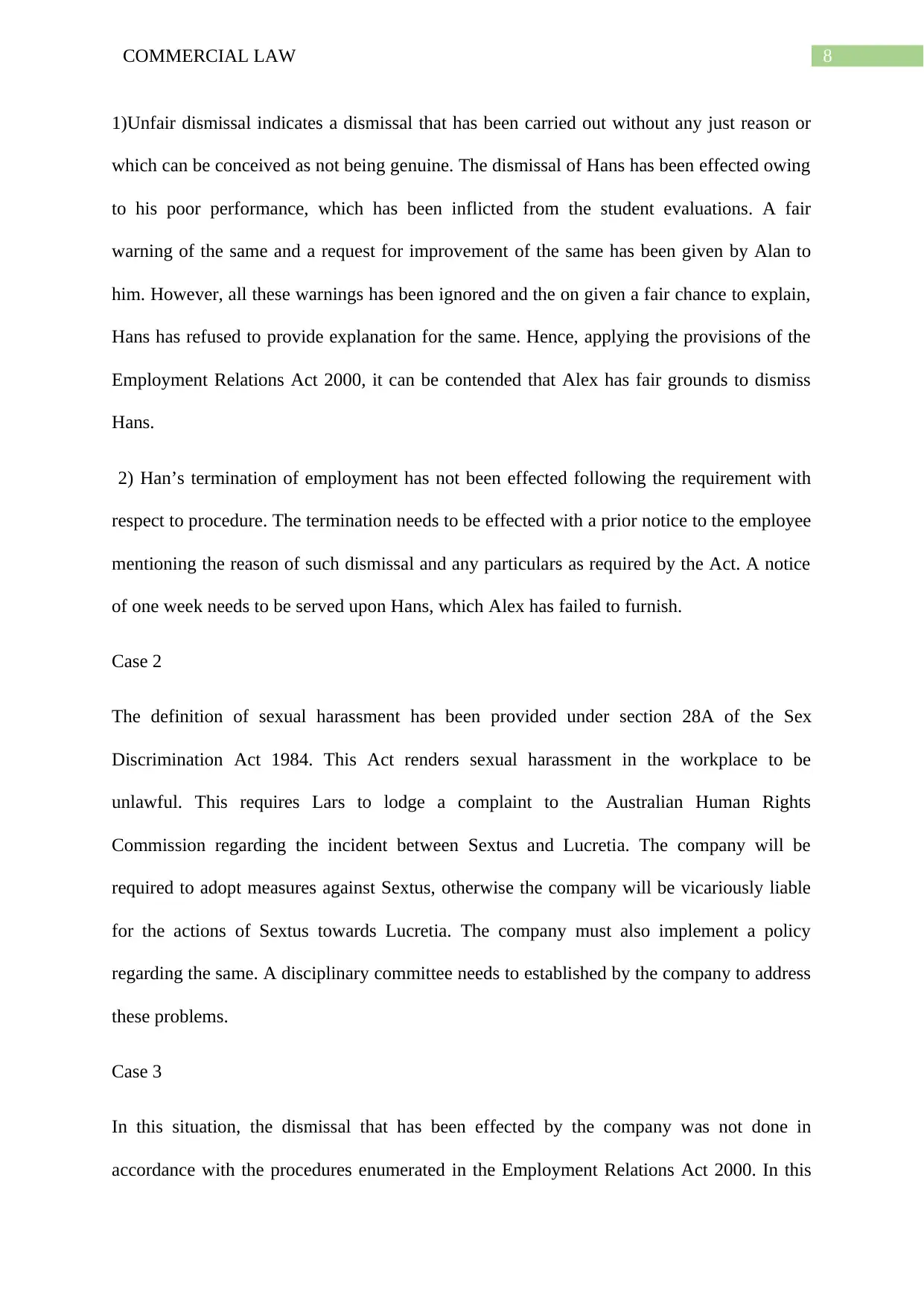
8COMMERCIAL LAW
1)Unfair dismissal indicates a dismissal that has been carried out without any just reason or
which can be conceived as not being genuine. The dismissal of Hans has been effected owing
to his poor performance, which has been inflicted from the student evaluations. A fair
warning of the same and a request for improvement of the same has been given by Alan to
him. However, all these warnings has been ignored and the on given a fair chance to explain,
Hans has refused to provide explanation for the same. Hence, applying the provisions of the
Employment Relations Act 2000, it can be contended that Alex has fair grounds to dismiss
Hans.
2) Han’s termination of employment has not been effected following the requirement with
respect to procedure. The termination needs to be effected with a prior notice to the employee
mentioning the reason of such dismissal and any particulars as required by the Act. A notice
of one week needs to be served upon Hans, which Alex has failed to furnish.
Case 2
The definition of sexual harassment has been provided under section 28A of the Sex
Discrimination Act 1984. This Act renders sexual harassment in the workplace to be
unlawful. This requires Lars to lodge a complaint to the Australian Human Rights
Commission regarding the incident between Sextus and Lucretia. The company will be
required to adopt measures against Sextus, otherwise the company will be vicariously liable
for the actions of Sextus towards Lucretia. The company must also implement a policy
regarding the same. A disciplinary committee needs to established by the company to address
these problems.
Case 3
In this situation, the dismissal that has been effected by the company was not done in
accordance with the procedures enumerated in the Employment Relations Act 2000. In this
1)Unfair dismissal indicates a dismissal that has been carried out without any just reason or
which can be conceived as not being genuine. The dismissal of Hans has been effected owing
to his poor performance, which has been inflicted from the student evaluations. A fair
warning of the same and a request for improvement of the same has been given by Alan to
him. However, all these warnings has been ignored and the on given a fair chance to explain,
Hans has refused to provide explanation for the same. Hence, applying the provisions of the
Employment Relations Act 2000, it can be contended that Alex has fair grounds to dismiss
Hans.
2) Han’s termination of employment has not been effected following the requirement with
respect to procedure. The termination needs to be effected with a prior notice to the employee
mentioning the reason of such dismissal and any particulars as required by the Act. A notice
of one week needs to be served upon Hans, which Alex has failed to furnish.
Case 2
The definition of sexual harassment has been provided under section 28A of the Sex
Discrimination Act 1984. This Act renders sexual harassment in the workplace to be
unlawful. This requires Lars to lodge a complaint to the Australian Human Rights
Commission regarding the incident between Sextus and Lucretia. The company will be
required to adopt measures against Sextus, otherwise the company will be vicariously liable
for the actions of Sextus towards Lucretia. The company must also implement a policy
regarding the same. A disciplinary committee needs to established by the company to address
these problems.
Case 3
In this situation, the dismissal that has been effected by the company was not done in
accordance with the procedures enumerated in the Employment Relations Act 2000. In this
⊘ This is a preview!⊘
Do you want full access?
Subscribe today to unlock all pages.

Trusted by 1+ million students worldwide
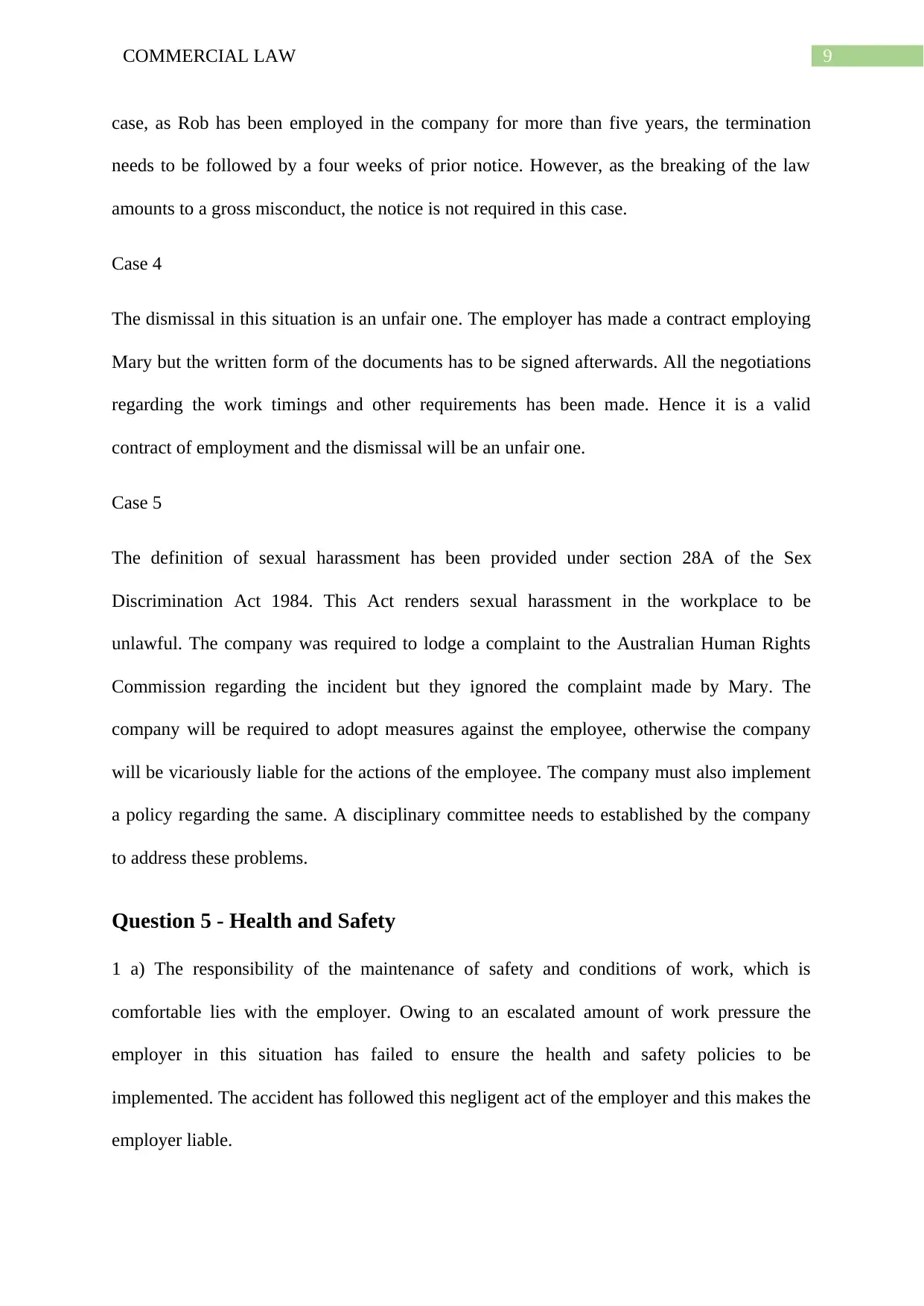
9COMMERCIAL LAW
case, as Rob has been employed in the company for more than five years, the termination
needs to be followed by a four weeks of prior notice. However, as the breaking of the law
amounts to a gross misconduct, the notice is not required in this case.
Case 4
The dismissal in this situation is an unfair one. The employer has made a contract employing
Mary but the written form of the documents has to be signed afterwards. All the negotiations
regarding the work timings and other requirements has been made. Hence it is a valid
contract of employment and the dismissal will be an unfair one.
Case 5
The definition of sexual harassment has been provided under section 28A of the Sex
Discrimination Act 1984. This Act renders sexual harassment in the workplace to be
unlawful. The company was required to lodge a complaint to the Australian Human Rights
Commission regarding the incident but they ignored the complaint made by Mary. The
company will be required to adopt measures against the employee, otherwise the company
will be vicariously liable for the actions of the employee. The company must also implement
a policy regarding the same. A disciplinary committee needs to established by the company
to address these problems.
Question 5 - Health and Safety
1 a) The responsibility of the maintenance of safety and conditions of work, which is
comfortable lies with the employer. Owing to an escalated amount of work pressure the
employer in this situation has failed to ensure the health and safety policies to be
implemented. The accident has followed this negligent act of the employer and this makes the
employer liable.
case, as Rob has been employed in the company for more than five years, the termination
needs to be followed by a four weeks of prior notice. However, as the breaking of the law
amounts to a gross misconduct, the notice is not required in this case.
Case 4
The dismissal in this situation is an unfair one. The employer has made a contract employing
Mary but the written form of the documents has to be signed afterwards. All the negotiations
regarding the work timings and other requirements has been made. Hence it is a valid
contract of employment and the dismissal will be an unfair one.
Case 5
The definition of sexual harassment has been provided under section 28A of the Sex
Discrimination Act 1984. This Act renders sexual harassment in the workplace to be
unlawful. The company was required to lodge a complaint to the Australian Human Rights
Commission regarding the incident but they ignored the complaint made by Mary. The
company will be required to adopt measures against the employee, otherwise the company
will be vicariously liable for the actions of the employee. The company must also implement
a policy regarding the same. A disciplinary committee needs to established by the company
to address these problems.
Question 5 - Health and Safety
1 a) The responsibility of the maintenance of safety and conditions of work, which is
comfortable lies with the employer. Owing to an escalated amount of work pressure the
employer in this situation has failed to ensure the health and safety policies to be
implemented. The accident has followed this negligent act of the employer and this makes the
employer liable.
Paraphrase This Document
Need a fresh take? Get an instant paraphrase of this document with our AI Paraphraser

10COMMERCIAL LAW
1 b) Under the Health and Safety at Work Act 2015, the employer is required to ensure the
health and safety of the employees, suppliers, customers, contractors, volunteers and any
other person who has been contacted in the course of the business. The employers are
required to keep the work environment safe.
2 a) The employer failed to ensure rotation with respect to shifts and the breaks and schedule
were not proper. The employee action was not monitored properly and it lacked supervision.
The proper communication between management and supervisors was absent. The machinery
has been handled in a manner which is not safe. The work environment was not usual.
2 b)
Hazard Notification Form
Your name: Date: Location: Notification to:
Date observed:
Description of hazard including significance in
your opinion:
Any immediate
action taken to
mitigate:
(please describe)
Your
recommendations to
control or eliminate
the hazard:
Signature of person notifying this hazard:
Health and safety representative report including analysis and action taken:
1 b) Under the Health and Safety at Work Act 2015, the employer is required to ensure the
health and safety of the employees, suppliers, customers, contractors, volunteers and any
other person who has been contacted in the course of the business. The employers are
required to keep the work environment safe.
2 a) The employer failed to ensure rotation with respect to shifts and the breaks and schedule
were not proper. The employee action was not monitored properly and it lacked supervision.
The proper communication between management and supervisors was absent. The machinery
has been handled in a manner which is not safe. The work environment was not usual.
2 b)
Hazard Notification Form
Your name: Date: Location: Notification to:
Date observed:
Description of hazard including significance in
your opinion:
Any immediate
action taken to
mitigate:
(please describe)
Your
recommendations to
control or eliminate
the hazard:
Signature of person notifying this hazard:
Health and safety representative report including analysis and action taken:

11COMMERCIAL LAW
Date entered into the hazard register:
Signature of health and safety
representative:
Date entered into the hazard register:
Signature of health and safety
representative:
⊘ This is a preview!⊘
Do you want full access?
Subscribe today to unlock all pages.

Trusted by 1+ million students worldwide
1 out of 13
Related Documents
Your All-in-One AI-Powered Toolkit for Academic Success.
+13062052269
info@desklib.com
Available 24*7 on WhatsApp / Email
![[object Object]](/_next/static/media/star-bottom.7253800d.svg)
Unlock your academic potential
Copyright © 2020–2026 A2Z Services. All Rights Reserved. Developed and managed by ZUCOL.





